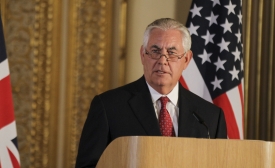Rex Tillerson

Philip Seib reflects on the U.S secretary of state's relatively short tenure, surveys the damage from his departure and offers some advice to his successor.
Under the leadership of Donald Trump and Rex Tillerson, the State Department is considering a mission reform that includes the abandonment of democratic assistance and human rights.
After coming under pressure from lawmakers, Secretary of State Rex Tillerson has taken steps toward spending tens of millions of dollars to counter propaganda by Islamist extremists and governments such as Russia. A State Department official confirmed on Thursday that Tillerson last week approved the use of about $60 million by the Global Engagement Center toward the anti-propaganda efforts.
Secretary of State Rex Tillerson outlined a major reorganization of the State Department, eliminating a raft of special envoy posts established to reach out to Muslim communities, support anti-government fighters in Syria, and curb the environmental devastation wrought by global warming. In a letter to Bob Corker, the Chairman of the of the Senate Committee on Foreign Relations, Tillerson cited concern about the proliferation of 70 special envoys positions in recent decades, including positions set up years ago to promote peace in Ireland and restore diplomatic relations with Burma.
Ben Cardin (Md.), ranking Democrat on the Senate Foreign Relations Committee, has had enough with Secretary of State Rex Tillerson’s mismanagement. On Tuesday, he sent a blistering letter[.] [...] The notion that one can run a giant organization out of a senior staff office is something an oil executive might think up; in government, it’s a disaster. Cutting out thousands of professional diplomats deprives one of not only expertise but also bandwidth (try managing two or three major crises with only a couple of dozen key players).
Several times a week the State Department sends a greeting to a foreign country on the occasion of its national day. By tradition, the salutations have been written by low-level diplomats and routinely approved by their superiors. But not anymore. Now the messages go through Secretary of State Rex W. Tillerson’s office, where his top assistants insist on vetting them, and where they often sit for weeks before coming back with extensive editing changes, according to several department officials.
U.S. Secretary of State Rex Tillerson is defending his efforts to redesign the State Department, but the process has left many of its 36,000 employees in Washington and around the world feeling anxious about their mission. Tillerson was welcomed warmly to the State Department six months ago. But some current and former ambassadors and foreign policy experts say they are worried about a number of indications that the Trump administration plans to lower the priority of promoting democracy and human rights in U.S. foreign policy.







